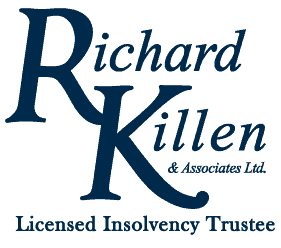Bankruptcy Counselors Toronto vs Licensed Insolvency Trustee
Posted on: October 10, 2016Posted in Bankruptcy, Consolidation Loans, Consumer Proposals | Comments Off on Bankruptcy Counselors Toronto vs Licensed Insolvency Trustee

It almost sounds funny, doesn’t it? Bankruptcy Counselors Toronto – somebody who counsels people, presumably in Toronto, on how to go bankrupt? Perhaps the term is misleading? I think so. Real Bankruptcy Counselors, in Toronto or elsewhere, don’t counsel people to go bankrupt. In fact a Bankruptcy Counselor would probably spend more time trying to figure out how the person seeking advice could stay out of bankruptcy rather than go in it.
The term Bankruptcy Counselor itself is probably incorrect, at least in terms of the title itself. There are no Bankruptcy Counselors in that sense. What we do have are Licensed Insolvency Trustees in bankruptcy, such as Richard Killen & Associates Ltd., who are Federally licensed to administer the legal process called bankruptcy, along with other processes under the Bankruptcy and Insolvency Act called proposals and Consumer Proposals.
But a Trustee (it’s quite a mouthful to keep saying Licensed Insolvency Trustee when you are writing an article) is uniquely placed to talk to a person in debt trouble about bankruptcy, or a consumer proposal, as an option to deal with their debt problems. The Trustee can explain in detail how they work, how they might apply to that person’s situation, what the short term, medium term and long term practical advantages and disadvantages are. What effect they may have on all kinds of practical situations such as employment, bonding, mortgage renewals, and so forth. There are so many questions and so many areas of concern that people have when they are trying to solve their debt problems.
Let’s face it. Nobody actually wants to go bankrupt and making a consumer proposal is not much higher on a person’s to do list, is it? And let’s face something else. Though nobody wants debt trouble, it does happen. In today’s world of relatively easy access to consumer credit such as credit cards and lines of credit, not to mention mortgages and car loans, is it any wonder people get into debt trouble. This is not to say that we are not responsible for our actions, but not everyone can live every moment of their life within the proper bounds of prudence and coldly logical decision-making. Being human emotions come into play and do make some financial decisions without properly thinking it through. Later if something bad happens, like losing a job or coming down with an injury or an illness, what is a person supposed to do?
The answer, of course, is to do the best they can. That’s what most people do.- the best they can. But, if things go from bad to worse, there will come a time when the best they can is no longer good enough for their creditors, who simply want to get paid. When it gets to that point, there are not that many options available. In fact, depending on the severity of the trouble (How far behind you are with your payments? Are creditors threatening legal action?) there may only be one way that the person can maintain some control over his or her situation: use the Bankruptcy and Insolvency Act.
But using the solutions provided by a federal law is not something you should go into on a wing and a prayer. A little information might be in order and this information will have to come from someone who knows all sides of it. That is what the Licensed Insolvency Trustee (I used the whole title here so I could explain it) is supposed to be – the go to guy. Let’s look at what the title means and how it might relate to the term Bankruptcy Counselors Toronto.
“Licensed” simply refers to the fact that the Federal government, through the agency of the Office of the Superintendent of Bankruptcy, is mandated by law to oversee the administration of each and every bankruptcy and proposal filed in Canada. The law though says that a Trustee must be appointed to actually do the administration of each bankruptcy or proposal. So, the OSB determines who is qualified to be a Trustee through a series of investigation and heavy-duty testing and then licences those people it deems qualified to handle the job. That’s when they issue a licence.
“Insolvency” refers to the fact that this Trustee’s licence is specifically intended to relate to matters covered by the Bankruptcy and Insolvency Act. Let’s face it, the term trustee is used far and wide. For instance there are school trustees, who I am sure would not want to be confused with Insolvency Trustees. So the word Insolvency is stuck right in the middle to make it clear that these individuals are qualified specifically in that area and that they have been tested as to their ability to provide that service.
“Trustee” has a very broad meaning. The dictionary says a Trustee is a person given powers of administration over property and is legally bound to administer it solely for the purposes specified, in this case by the Bankruptcy and Insolvency Act. So in English that would appear to mean that a Trustee is responsible to administer the bankruptcy (and proposal) process for the purposes intended. Though that might cover a lot of ground, advising people about Bankruptcy or Proposals would certainly fall within that sphere.
All of which brings us back to the term Bankruptcy Counselor Toronto. If you are in debt trouble, facing a financial crisis, and you realize the fact, what can you do about it?
The first thing I think any rational person would do is get information, maybe advice. You can ask relatives and friends, but other than getting a little moral support, that may not prove too helpful. You can always consult a professional person such as a lawyer or an accountant. Either of these can be a good move, but may not be enough. An accountant generally deals in financial situations that have not yet gone off the rails, so to speak. He can recognize the negative reality of your situation, but may not know enough of the details of the options available to design a specific plan to get you out of trouble. Of course that depends on how bad the situation has become.
A lawyer is usually there to give a different kind of advice. In fact, unless you consult a lawyer specializing in insolvency matters there will likely be a practical limit to what a solicitor can do to help, again depending on how far things have deteriorated.
A financial consultant is likely to be a bit like an accountant in that he’s used to dealing with solvent situations and will not have a fluency with the practical and administrative details of the options available to you if your situation has become insolvent.
So we come back to the Licensed Insolvency Trustee as the only truly qualified Bankruptcy Counselor Toronto, or any other place.
If you need advice about what to do now that you have, or are about to fall behind with your credit card and other debt payments and want to retain some kind of control over your situation, the Licensed Insolvency Trustee is the go to guy. As a Bankruptcy Counselor Toronto, or elsewhere, the Trustee will not be your advocate like a lawyer would, but at Richard Killen & associates Ltd. we provide financial debt counselling services where in we will analyze your situation and explain it to you in understandable terms so that you can know what will be the best option for you to take to resolve the problem in a dignified and responsible manner. Is there a better way to take care of a problem?










